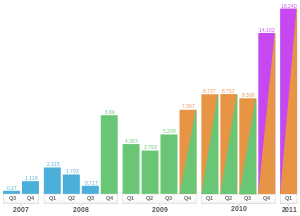I still love my Motorola Droid X even though it does occasionally get into a state where I need to pull out the battery to recover. The OS and the applications just keep getting better and better. There apparently will be a second generation of the Droid X, though details on the specifications are still sketchy. A more capable processor and better graphics seem likely though the current generation platform is no slouch on either count. We'll have to wait and see. I don't ever see myself wanting an iPhone. I've used both and for me the X is the superior solution.
This isn't to imply that iOS related devices don't have a place in my life. My wife and I own an iMac and various iPod's and iPod touch's. We're also currently awaiting the arrival of a base model iPad 2. I still can't justify the cost (both up front and ongoing) of the 3G based iPad's but with the WiFi hot spot capability of my Droid X it's easy to make the decision to forgo that capability in the iPad. We love our Kindle's but they just don't fill the same niche as the iPad.
There isn't a lot of news in the wild about what the next generation Kindle is going to look like. A color screen and touch capability would be great. Color seems doable given the availability of color EInk displays but the touch screen may be unlikely as Apple is apparently using a substantial part of the manufacturing capacity in this area and has used their big pile of cash to assure their supply by paying in advance. This has left other companies struggling to find supply to fill their own needs. Amazon would likely be wise to avoid going down that path right now.
On the Android front there has been a lot of talk recently about fragmentation and Google's attempts to discourage their partners from layering too much "value added" software on top of the base Android OS. As I've noted before, while fragmentation is certainly more of an issue for Android it is also present and growing in the iOS space. With each new device and generation that Apple introduces this problem grows. Developers no longer have the luxury of only keeping in mind the capabilities of one or two mobile devices. As I've noted before, developers for Windows PC's have had to deal with this for decades now so it isn't like new ground is being broken. Slightly complicating things is the fact that it's becoming increasingly clear that any company that wants to maximize their revenues in the mobile space is going to have to support both iOS and Android. I'm not trying to imply that the problems in this space are trivial, but the potential profits are substantial and expertise and tools are already being developed. I don't think we'll be hearing nearly as many complaints a couple of years from now.
There have been rumors that Motorola is amassing a dream team to create their own mobile OS as they aren't happy with the limited ability to differentiate themselves based on Android. While this isn't a surprising development it seems like a very risky one to me. The cost of creating a new platform is not insubstantial and with multiple well established players I don't like their chances unless they are going to try for some sort of middle ground where they leverage existing low cost technologies. Android at its heart is Linux and much of its code is freely available. There is nothing stopping Motorola from creating their own Linux based mobile platform. If they don't deviate too far from Android and stick with ARM based processors porting would be relatively simple which would improve their chances of ending up with a viable application pool.
At this point it seems fairly clear that ARM based processors are going to be at the core of a majority of mobile computing devices for the foreseeable future. This will somewhat ease porting across platforms that choose not to buck this trend. It does mean however that Intel is largely being left out in the cold. PC's and servers are not going away but they certainly seem likely to shrink in terms of relative importance. Intel is a large and diverse company of course but if I were a shareholder I couldn't help but be a little worried about how things are going. It may be unthinkable today but I can see a time when Intel licenses the ARM architecture and puts their own spin on it. Intel could certainly bring out a highly competitive product quickly from a specification perspective and with their ownership of and expertise in the fabrication of processors they could also do it at a highly competitive price. Their vertical integration could be a big win for them. They'll need a competitive mobile GPU to make this approach viable. A partnership with NVidia while unthinkable might be smart for both companies.
Image via Wikipedia


No comments:
Post a Comment